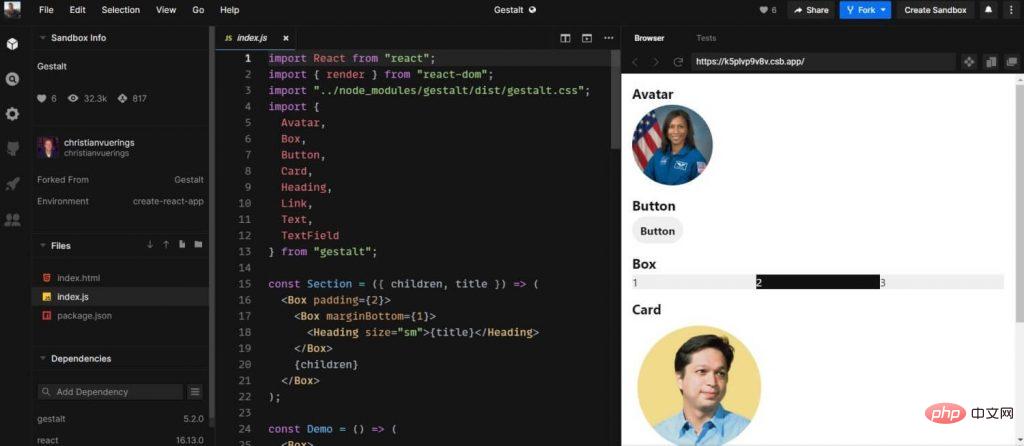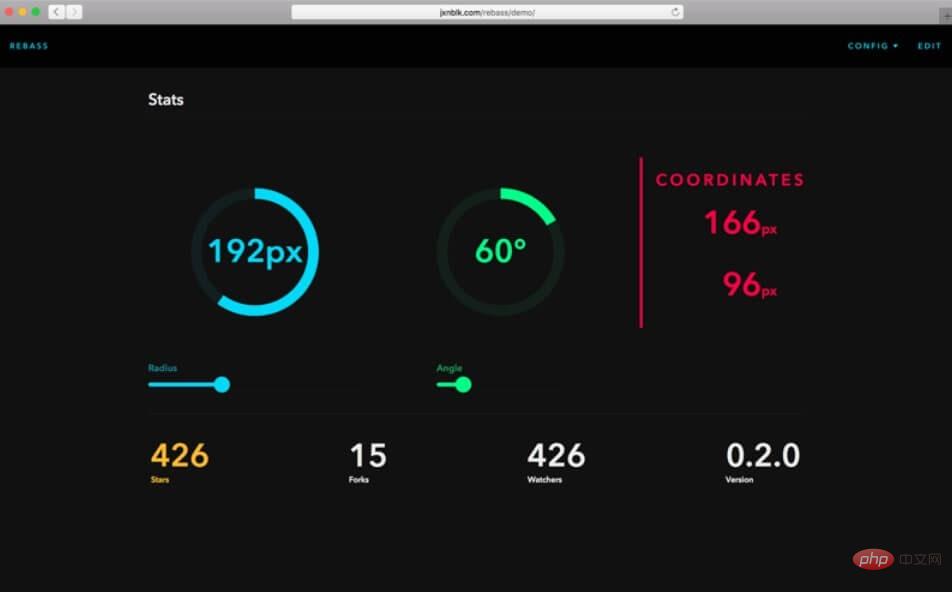What ui component library does react use?
The ui component libraries available for react are: 1. Material-UI, which has components for layout, forms, navigation, data display and many other widgets; 2. Ant Design, which has more than 60 components, with Predictable static typing; 3. Blueprint, with more than 40 components; 4. React Bootstrap, providing full compatibility with a large number of existing Bootstrap themes; 5. Onsen UI, providing tabs, side menus, stack navigation, Lists, forms and other components.

#The operating environment of this tutorial: Windows7 system, react18 version, Dell G3 computer.
react component library
1、Material-UI

Material-UI is the most popular and commonly used React component library on GitHub. It's simple, lightweight, and built according to Google's Material-UI specifications. There are components for layout, forms, navigation, data display and many other widgets.
You can style your components using @material-ui/styles, a fast, scalable CSS-in-JS solution with the same benefits as styled components. Material-UI also interoperates with other major styling solutions, so you don't have to use its styles.
2. Ant Design
Ant Design is a Chinese company with a React library designed for web applications of large companies. Examples include Tencent, Alibaba and Baidu. This library has over 60 components written in TypeScript with predictable static typing. Its Chinese and English documents are concise, elegantly written, and comprehensive in content.
But Ant Design is more than just a React UI library. It is an entire design system built around the values of growth, meaning, certainty and nature. Check out their resources for a Figma UI kit, landing page templates, a Sketch plugin, and more, and it’s our go-to React component library.
3. Blueprint

#As a commonly used React component library, Blueprint provides rich and popular components. Blueprint is a React UI library developed by Palantir, an American big data analysis technology company. Their React library has over 40 components, specifically optimized for complex data-intensive interfaces for desktop applications.
Blueprint is written in TypeScript, as are all code examples in their documentation. The library supports Chrome, Firefox, Safari, IE 11 and Microsoft Edge. IE10 and below are not supported due to lack of support for CSS flex layout.
4. React Bootstrap
React Bootstrap serves as a replacement for Bootstrap JavaScript. Each component is built as a true React component, so there is no need to rely on jQuery. React Bootstrap is one of the oldest React libraries and has grown steadily with React itself. Since there are a large number of old users using Bootstrap, React Bootstrap is also a more commonly used React component library.
Bootstrap’s grid system means your layout will have a fully responsive series of containers, rows and columns. You can choose between dozens of components, including badges, carousels, toasts, and jumbotrons.
It provides full compatibility with a large number of already existing Bootstrap themes, as well as a long list of components with total power for each theme. React Bootstrap updates state into a virtual DOM, which is a more stable development solution by integrating Bootstrap's functionality into React's virtual DOM.
5, Onsen UI

Onsen UI is a commonly used Reac component library designed to build HTML5 and mobile web applications . Its components include tabs, side menus, stack navigation, lists, forms, and more. All components support iOS and Android material design and automatically change the appearance of your app based on the platform.
Internally, Onsen consists of three layers: CSS components written in cssnext, web components written in native JavaScript, framework bindings for easy integration with React, and Vue and Angular.
6. Grommet

7、Gestalt

Gestalt is a set of React UI components that enhance Pinterest’s design language. Its purpose is to create a shared library of design best practices. The library supports right-to-left, internationalization and dark mode.
Gestalt is relatively low maintenance due to its automatic design and code updates that run cross-platform. When a release results in breaking changes - in usage or input - it provides a codemod to simplify the upgrade process.
8. Semantic UI React

React is the official Semantic UI plug-in. It is jQuery agnostic and features a declarative API, simplified props, subcomponents, extensions, automatic control of state, and more. The library has a collection of over 50 components, including fragments, progress bars, transitions, pagination, and more.
Semantic UI React provides components, while Semantic UI provides themes in the form of CSS style sheets. You can also use
9, Rebass

Rebass is an original component library and a commonly used React component library, styled by Brent Jackson System building. It is built to create a consistent UI with design constraints and user-defined scale. Rebass's footprint is only 4KB, which means fast design and development.
Rebass hopes to achieve minimal, useful, unconstrained, extensible and themable through first-class theming support and compatibility with Theme UI.
10. React Virtualized
#React Virtualized focuses on specific aspects of any UI in a unique React component library, making rendering tables fairly easy in most cases. With React Virtualized, web developers can easily render large amounts of data by using components such as lists, tables, grids, collections, etc. It can be used to create more user-friendly tables. React Virtualized already has a complete sequence of instructions to set it up.
11. Blueprint UI React
The Blueprint UI React component framework is the same UI development path for all new data-intensive desktop and web applications. It is a React-based UI toolkit designed for creating complex data-intensive interfaces for desktop applications. This is a great UI package that aims to provide out-of-the-box usability standards for all components and gives you access to light and dark theme modes.
12. React Toolbox
React Toolbox is a series of React components that implement Google Material Design requirements. It is based on some of the most common proposals such as CSS Modules (written in SASS), Webpack and ES6. The library is tightly integrated with your web package workflow, fully configurable and versatile.
It provides many components such as buttons, cards, date pickers, dialogues and other common elements. Enabling web developers to build stunning web applications, the library also includes comprehensive documentation.
[Related recommendations: Redis video tutorial]
The above is the detailed content of What ui component library does react use?. For more information, please follow other related articles on the PHP Chinese website!

Hot AI Tools

Undresser.AI Undress
AI-powered app for creating realistic nude photos

AI Clothes Remover
Online AI tool for removing clothes from photos.

Undress AI Tool
Undress images for free

Clothoff.io
AI clothes remover

Video Face Swap
Swap faces in any video effortlessly with our completely free AI face swap tool!

Hot Article

Hot Tools

Notepad++7.3.1
Easy-to-use and free code editor

SublimeText3 Chinese version
Chinese version, very easy to use

Zend Studio 13.0.1
Powerful PHP integrated development environment

Dreamweaver CS6
Visual web development tools

SublimeText3 Mac version
God-level code editing software (SublimeText3)

Hot Topics
 1668
1668
 14
14
 1426
1426
 52
52
 1328
1328
 25
25
 1273
1273
 29
29
 1256
1256
 24
24
 How to build a reliable messaging app with React and RabbitMQ
Sep 28, 2023 pm 08:24 PM
How to build a reliable messaging app with React and RabbitMQ
Sep 28, 2023 pm 08:24 PM
How to build a reliable messaging application with React and RabbitMQ Introduction: Modern applications need to support reliable messaging to achieve features such as real-time updates and data synchronization. React is a popular JavaScript library for building user interfaces, while RabbitMQ is a reliable messaging middleware. This article will introduce how to combine React and RabbitMQ to build a reliable messaging application, and provide specific code examples. RabbitMQ overview:
 React Router User Guide: How to implement front-end routing control
Sep 29, 2023 pm 05:45 PM
React Router User Guide: How to implement front-end routing control
Sep 29, 2023 pm 05:45 PM
ReactRouter User Guide: How to Implement Front-End Routing Control With the popularity of single-page applications, front-end routing has become an important part that cannot be ignored. As the most popular routing library in the React ecosystem, ReactRouter provides rich functions and easy-to-use APIs, making the implementation of front-end routing very simple and flexible. This article will introduce how to use ReactRouter and provide some specific code examples. To install ReactRouter first, we need
 PHP, Vue and React: How to choose the most suitable front-end framework?
Mar 15, 2024 pm 05:48 PM
PHP, Vue and React: How to choose the most suitable front-end framework?
Mar 15, 2024 pm 05:48 PM
PHP, Vue and React: How to choose the most suitable front-end framework? With the continuous development of Internet technology, front-end frameworks play a vital role in Web development. PHP, Vue and React are three representative front-end frameworks, each with its own unique characteristics and advantages. When choosing which front-end framework to use, developers need to make an informed decision based on project needs, team skills, and personal preferences. This article will compare the characteristics and uses of the three front-end frameworks PHP, Vue and React.
 Integration of Java framework and front-end React framework
Jun 01, 2024 pm 03:16 PM
Integration of Java framework and front-end React framework
Jun 01, 2024 pm 03:16 PM
Integration of Java framework and React framework: Steps: Set up the back-end Java framework. Create project structure. Configure build tools. Create React applications. Write REST API endpoints. Configure the communication mechanism. Practical case (SpringBoot+React): Java code: Define RESTfulAPI controller. React code: Get and display the data returned by the API.
 How to use React to develop a responsive backend management system
Sep 28, 2023 pm 04:55 PM
How to use React to develop a responsive backend management system
Sep 28, 2023 pm 04:55 PM
How to use React to develop a responsive backend management system. With the rapid development of the Internet, more and more companies and organizations need an efficient, flexible, and easy-to-manage backend management system to handle daily operations. As one of the most popular JavaScript libraries currently, React provides a concise, efficient and maintainable way to build user interfaces. This article will introduce how to use React to develop a responsive backend management system and give specific code examples. Create a React project first
 Vue.js vs. React: Project-Specific Considerations
Apr 09, 2025 am 12:01 AM
Vue.js vs. React: Project-Specific Considerations
Apr 09, 2025 am 12:01 AM
Vue.js is suitable for small and medium-sized projects and fast iterations, while React is suitable for large and complex applications. 1) Vue.js is easy to use and is suitable for situations where the team is insufficient or the project scale is small. 2) React has a richer ecosystem and is suitable for projects with high performance and complex functional needs.
 React's Role in HTML: Enhancing User Experience
Apr 09, 2025 am 12:11 AM
React's Role in HTML: Enhancing User Experience
Apr 09, 2025 am 12:11 AM
React combines JSX and HTML to improve user experience. 1) JSX embeds HTML to make development more intuitive. 2) The virtual DOM mechanism optimizes performance and reduces DOM operations. 3) Component-based management UI to improve maintainability. 4) State management and event processing enhance interactivity.
 What closures does react have?
Oct 27, 2023 pm 03:11 PM
What closures does react have?
Oct 27, 2023 pm 03:11 PM
React has closures such as event handling functions, useEffect and useCallback, higher-order components, etc. Detailed introduction: 1. Event handling function closure: In React, when we define an event handling function in a component, the function will form a closure and can access the status and properties within the component scope. In this way, the state and properties of the component can be used in the event processing function to implement interactive logic; 2. Closures in useEffect and useCallback, etc.




